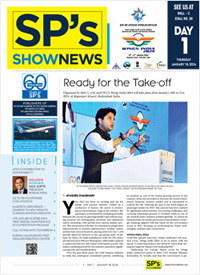- Prime Minister Narendra Modi inaugurates Aero India 2023 in Bengaluru; Releases Commemorative Stamp
- Defence Secretary meets delegations from Saudi Arabia, USA and Oman on the sidelines of Aero India 2023
- Foreign Ministers of 32 countries to attend Aero India 2023
- Embraer showcases the C-390 Millennium at Aero India 2023
Transform India into innovation warehouse using advance manufacturing
I believe that ‘Make in India’ as a vision is the most relevant policy dictum announced by any leader since independence. The vision when implemented will unswervingly alter the paradigm and transform India into a major technology hub for production of homegrown defence systems.
Under the new framework, co-development; co-production and joint R&D on defence systems will define the new rules of the game as India becomes more and more intertwined with the multifaceted global defence supply chain, naturally far more complex when compared to the industrial world. While India has been witnessing accelerated transformation at all levels, defence manufacturing will naturally be the cornerstone driving the change since the leadership has identified defence as its core sector in the Make in India strategy.
Therefore the strategy guiding ‘Make in India’ should broadly entail acquiring knowledge in design and system engineering and access to technology by partnering with foreign OEMs. India is a highly innovative place centred on affordability with huge appetite to improvise ingenious solutions. Hence focus on indigenization will largely redefine the manufacturing landscape in a stressed global economic environment and India could emerge as a major defence sourcing hub but by nattily leveraging labour arbitrage for low cost high quality manufacturing.
Strategic Positioning of Make in India: As a unique initiative, Ministry of Defence for the first time formulated a Standard Operating Procedure (SOP) for Defence Export Strategy recognizing that both domestic and foreign investors will require government support to promote export of military hardware. The government announced several initiatives like setting-up web based portals to receive No Objection Certificates (NOC) for military stores, dispensed with the requirement of End User Certificate (EUC) for components, sub-systems and subassemblies by moving items out of Annexure 1 to ease exports.
The new draft Defence Export Strategy has tacitly recognised that long term sustainability of the defence industry in India cannot happen by catering for domestic markets alone, but by strategically positioning ‘Make in India’ in such a way that it not only addresses domestic demands but also caters to the global requirements which will then connect large sections of Indian homegrown defence industry including the MSMEs with the global defence supply chain.A robust defence industry coupled with potential to export military hardware will be far better equipped to modernise Indian armed forces with advanced and cost-effective weapon systems at an accelerated pace than one which solely depends on a single buyer which is the government to earn revenues.
Transform India into Most Competitive Manufacturing Destination in the World: In conclusion success of ‘Make in India’ will broadly be underpinned in ground-breaking effort to direct scientific and engineering talent towards innovation. While huge capability exists to design complex systems in India, steps must however be taken to incentivise research and development, remove stigma attached to failures, create functional synergy between private sector, DPSU and DRDO, expand source of funding which would then transform India into a major repository of knowledge and a competitive advanced manufacturing destination favourably impacting India’s defence economy by 2025.
For India to transform into a manufacturing destination, the change will naturally be steered by companies from basic industries such as metallurgy and forging. Hence Bharat Forge Limited by virtue of its being the largest forging company in the world with in-depth knowledge in metallurgy and, engineering innovation at its heart will play a critical role to build India’s hard power— essential instrument to guarantee national security.
Baba Kalyani is the Chairman and Managing Director of Bharat Forge Limited.





